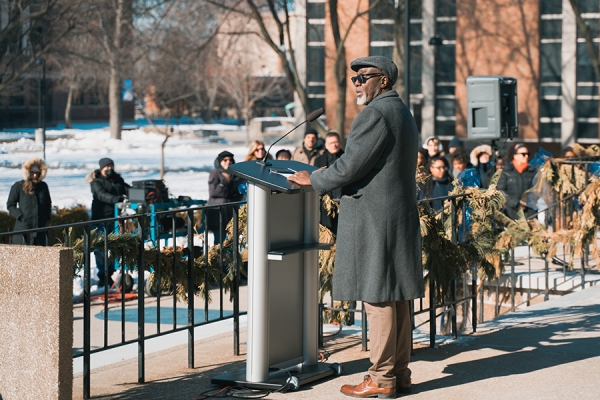 The University of Windsor is the recipient of a $100,000 grant from the Bell Let’s Talk Post-Secondary Fund to expand the UWorkItOut UWin program. Pictured here are UWorkItOut UWin grad students Melissa Paré and Aidan Kovacs, and kinesiology professors Krista Chandler, Chad Sutherland, and Todd Loughead.
The University of Windsor is the recipient of a $100,000 grant from the Bell Let’s Talk Post-Secondary Fund to expand the UWorkItOut UWin program. Pictured here are UWorkItOut UWin grad students Melissa Paré and Aidan Kovacs, and kinesiology professors Krista Chandler, Chad Sutherland, and Todd Loughead.
A UWindsor program that improves students’ mental health through physical exercise will expand thanks to a grant from the Bell Let’s Talk Post-Secondary Fund.
UWorkItOut UWin will receive $100,000 from the fund that supports mental health initiatives at universities, colleges, and cégeps across Canada.
“We would like to thank Bell Let’s Talk for the generous contribution,” said Krista Chandler, who founded UWorkItOut UWin with the help of fellow kinesiology professors Todd Loughead and Chad Sutherland. “This funding will allow us to continue to support our Lancer students and provide them with an exceptional university experience.”
UWorkItOut UWin is a six-week supervised exercise intervention to which participants are referred by the Student Counselling Centre. Student trainers guide participants through a semi-weekly exercise program. Exercise counsellors check in with participants weekly, offering advice on positive self-talk, goal setting, time management, and other coping strategies. At the end of the six weeks, participants can join a buddy system in which they are paired with other students to continue their workouts.
The program is proven to lessen anxiety and depression, and increase participants’ confidence, motivation, fitness levels, and overall well-being.
Graduate students in Sport Psychology and Physical Activity Research Collaborative use the program to research the mental health benefits of physical exercise, publishing their findings in academic journals and presenting at conferences. The program also offers hands-on training for kinesiology students in the Movement Science program.
“Bell Let’s Talk is pleased to provide a $100,000 Post-Secondary Fund grant to the University of Windsor to support student mental health through physical exercise,” said Mary Deacon, chair of Bell Let’s Talk. “The Bell Let’s Talk Post-Secondary Fund has supported many initiatives such as this that are improving student health and wellness across Canada.”
This is the fourth year that Bell has funded mental-health programs for post-secondary students. The funding is part of the company’s national effort to raise awareness of mental health.
Mental health statistics in Canada are troubling. Of the more than 200 Canadians who attempt suicide each day, 12 will die. A quarter of all Canadians report experiencing high levels of anxiety. And half of Canadians struggling with mental health issues aren’t getting the help they need.
Bell Let’s Talk Day is Jan. 24. Canadians are urged to use the day to choose a mental health organization to learn about or support; help a friend struggling with mental health; learn about how your school, workplace or community supports mental health; nurture your own well-being through mental health strategies; get involved in a mental health initiative or event; or simply talk about mental health to combat the stigma surrounding it.
—Sarah Sacheli







